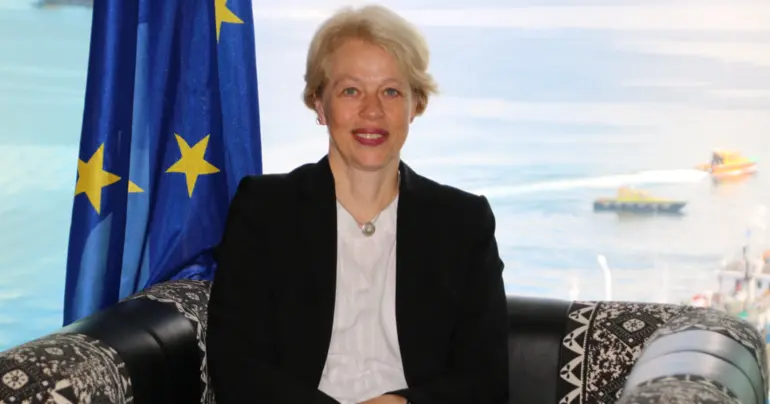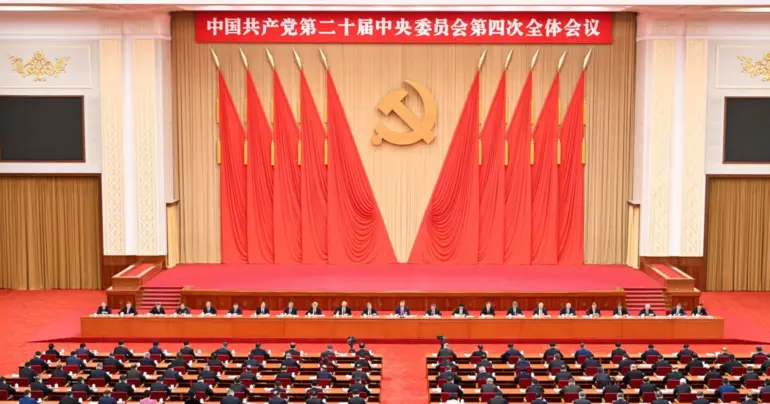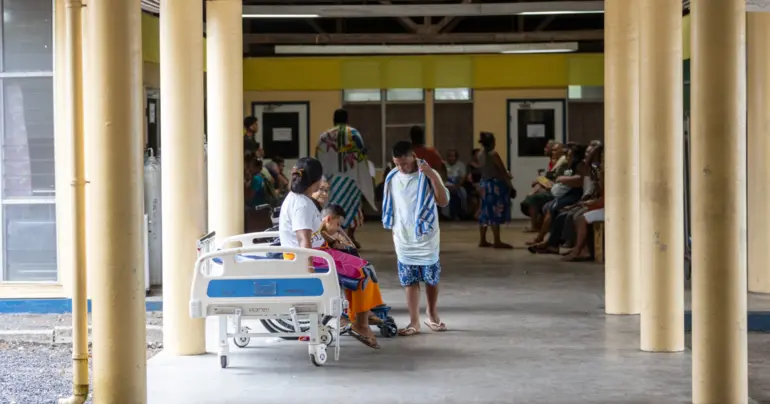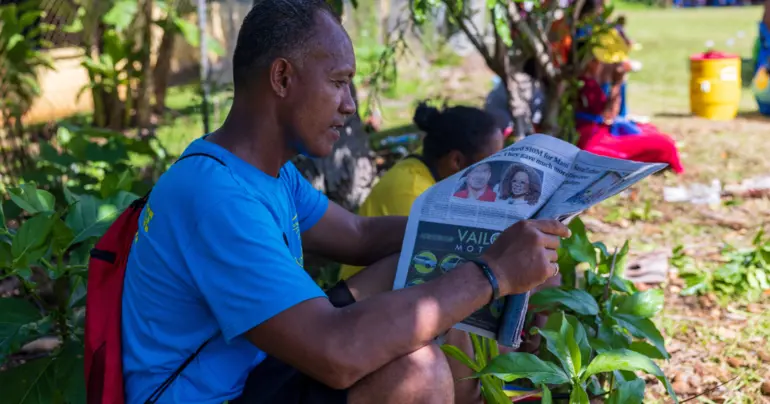Aust. High Commissioner's speech at the Digicel ICT Business Symposium
Navigating the Digital Future: Exploring Strategies for Security, Innovation, and Resilience in Samoa and the Pacific Region
In Australia, it is normal practice at an event such as this to pay respects to elders’ past, present and emerging, acknowledging their culture and deep connection to the land.
In this respect, here in Sogi, I would like to acknowledge Samoa’s ancestors who journeyed across this vast expanse of ocean thousands of years ago in search of prosperity.
Far from just a cultural practice, it is important to recognise the role Samoa’s ancestors played as trailblazers in developing technology, navigating their own early path through innovation.
Today’s theme of navigating the digital future is very timely, and I thank Digicel for the invitation to speak today. I think it is very important that we come together to talk about the opportunities that technology creates, and also the significant risks.
I’ve been asked today to talk about the importance of international cooperation in ICT.
We of course live in a world of incredible digital connectivity. And throughout the COVID pandemic, we saw a drastic change in how we engaged with technology. Technology replaced workplaces, weddings, and even hugs.
The evolving cyber and technological landscape has been a catalyst for progress, development and prosperity, transforming societies and economies and expanding opportunities for cooperation across our region.
Opportunities
That’s why Australian investment has been supporting greater connectivity and access to digital technologies across the Pacific. Technology features across many sectors of Australia’s partnership with Samoa and the broader Pacific, including in economic growth, security, education and health.
Through fantastic innovations such as SkyEye’s Maua App, farmers in Savaii are now able to sell produce digitally, and the Maua App is now finding similar success in Vanuatu.
Among many other digital initiatives, working with the Samoa Police we are supporting the digitisation of forensics.
And importantly, through Australia’s budget support to the Government of Samoa, students were able to continue their education throughout the pandemic with access to technology for home learning.
Our partnership in e-health – through Tamanu, Tupaia and mSupply – made a significant contribution to Samoa’s standout COVID vaccination program, enabling MOH staff to keep close track of who had been vaccinated and where, as well as keeping an eye on supplies.
I’m thrilled to see colleagues at MOH taking these investments and turning them into Samoan innovations. Samoa has led the way in the Pacific in the development of a digital vaccination certificate, and has developed clever ways to link this to other electronic record systems for a better, more efficient user experience.
I was pleased to participate in Digital Week just a few weeks ago, hosted by MCIT, which saw Samoan cyber security expert Tagiilima Neemia working in partnership with Australian co-founder of Girl Geek Academy Sarah Moran to promote opportunities for girls in ICT.
These technical solutions provide significant economic and social benefits, including for a diverse section of the community, for women and girls, and those living with a disability. These opportunities are allowing for sustainable development, in the Samoan way.
Risks
But while the first two decades of this millennium were dominated by optimisation and the pursuit of efficiency through technology, we are now in a different phase, requiring a greater focus on risk management and the building of resilience.
Greater connectivity means more direct threats of cyber security incidents and cybercrime.
That’s why Australia is undertaking a review of our Cyber Security strategy.
Currently under development, Australia’s Cyber Security Strategy for 2023–2030 represents a crucial window to lift Australia’s capability to meet the evolving challenges of cyberspace.
Cyber affairs are an integral element of Australia’s foreign and strategic policy, embedded in our regional and global engagement, and this will be reflected in the Strategy, including how we can do more on:
- promoting a rules-based cyberspace;
- holding accountable those that flout the rules;
- working to lift regional cyber resilience; and
- leveraging our humanitarian response track record to respond to severe cyber attacks
- while ensuring any new measures are consistent with Australia’s international obligations.
At home in Australia, we’ve seen three of the biggest data breaches in our history in just the last six months.
But we’re not the only country confronting the risks of cyber incidents in an interconnected and interdependent world.
All nations are currently grappling with how best to address risks in the cyber domain.
Australia, Samoa and the world’s security and prosperity are dependent on a region that is stable, prosperous, and guided by international law and norms – reflected in a rules-based cyberspace.
We know how important it is to work in partnership with our neighbours, to lift cyber security and build a cyber resilient region.
That is why Australia is proud to be a key partner for Samoa in cyber cooperation, a commitment confirmed through the Bilateral Partnership Arrangement – Ole Fala Folasia I Lo Ta Va– signed in March by Prime Minister Albanese and Prime Minister Fiame.
We have worked together on 14 cyber security capability projects so far, and have supported Samoa’s National Security and emergency response framework as it relates to cyber security, cybercrime and cyber awareness raising.
We have been pleased to assist Samoa in building resilience to cyber-attacks, and directly supported MCIT to establish Samoa’s Computer Emergency Response Team (SamCERT), and to build its capacity, including manage two separate ransomware attacks in 2022.
And further afield, we have lent support to both Vanuatu and Tonga in recent months to respond to cyber incidents.
Disinformation
Another key risk of our increasing digital interconnectivity I’d like to touch on today is disinformation – a threat we must take seriously as we navigate a digital future together. A threat we must address across the international community.
Much more than fake news and misleading tweets, disinformation undermines the international rules that promote a peaceful and stable region, and a world where sovereignty is respected, as so starkly demonstrated by Russia’s continued efforts to spread disinformation and false narratives regarding its illegal, immoral invasion of Ukraine. Disinformation which even reaches the shores of Samoa. Just like the coronavirus. Borders are harder to close in the digital world.
Australia defines ‘disinformation’ as the intentional creation and dissemination of wholly or partly false or manipulated information that is intended to deceive and mislead audiences. This may be for the purpose of causing strategic, political, economic, social, or personal harm or financial/commercial gain.
Australia’s approach to countering disinformation, consistent with our values, is to safeguard our open and transparent information environment and maintain a diversity of views, underpinned by access to accurate and credible information.
More broadly, we are focused on building a region where all countries have choices, no country dominates, and no country is dominated.
Building resilience in the region’s information environment remains vital. Building this resilience includes building the capabilities of journalists, citizen’s digital literacy, and ensuring a diversity of perspectives are represented.
Government officials and civil society, including journalists, play a crucial role in reporting on local media environments, prominent narratives, disinformation campaigns, and news or events that are likely to be subject to information manipulation.
Pacific voices telling Pacific stories enables the community to proactively shape the stories Pasifika people want to tell, and reduces the space in which disinformation can grow.
Conclusion
As Foreign Minister Penny Wong has said, our region can navigate our shared challenges best when we do it together.
What is clear is that we cannot navigate the digital future alone – we don’t independently have all of the answers, and we need to work in partnership, supporting and learning from one another, as Pacific family. Just as we are doing today.
To our host’s, I wish you all the best for a successful ICT Business Symposium. Never has there been a more important time to come together to discuss the opportunities and challenges of a digital future.
Fa’afetai tele lava. Soifua Manuia











